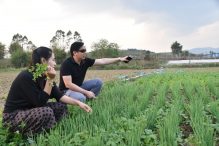The Mueng Lao Food Company, a local business based in Vientiane capital, Laos, has been studying the fresh vegetable market for over a year and found out that massive fresh produce is being imported from Thailand to feed the people of Vientiane. More than seven (7) tons of spring onions alone are being imported on a daily basis.
In January 2019, the Lao Farmer Network (LFN) organized a workshop involving buyers and producers. Mueng Lao Company participated in this workshop and they proposed to buy over 60 items of fresh vegetables daily including two (2) tons of spring onions for a fixed price.

With this opportunity, LFN brought the company to arrange a contract with three (3) LFN members namely the Thongmang organic vegetable group in Vientiane capital, Hoi vegetable cooperative, and Paek agriculture cooperative in Xiengkhouang province. These three groups will supply of the company with a total of 450 kilograms of spring onions daily.
The contract with the Thongmang group started in March 2019. The group supplied 150 kilograms of spring onions per day since April 2019 at four (4) fixed prices in different periods throughout the year starting from 8,000 to 17,000 LAK (USD 0.92 to USD 2) per kilogram.

Even though the price is almost the same as the price in the regular market, the farmers are happy because they now have access to a regular market. A regular market will help them make a better investment plan, coordinate production plans, and generate a regular income.
“Our members used to make about 2 million LAK (USD 230) per month, but since they got this spring onion partnership, they now make about 6 million LAK (USD 692) a month,” said Ms. Khammone Louanglath, the head of Thongmang group.
Bounthieng Lattanavong, director of Mueng Lao Company, added, “the farmers always complain that there is no market for their produce. This is not true. The local market is big, but the problem is that the farmers do not have a regular supply. With this arrangement, I want to show to the farmers that together we can do it.”

Innovative Feature
Market-oriented commercial agriculture. Once the market is ensured, the farmers can be better organized and invest in production effectively.
Impact
The production cost of spring onions is about 4,000 LAK (USD .46 )kg, with a fixed price of at least 8,000 LAK to 17,000 LAK USD .92 – USD 2, the farmer gains at least 100% profit from the production cost.

Facilitating Factors
- There is a huge local market for fresh vegetable
- Spring onions take 35 days to harvest. The turnover is short which is good for the farmers in terms of cash flow.
- Some farmers are close to the market
Challenges
- Some farmers are far from the market which increases transport costs.
Lessons Learned
- The specifications of the products are very important including the exact varieties that the market wants, thus, the seed needs to be ensured.
- Transportation needs to be carefully considered. If the product will not fetch a substantial amount, then it is not worth transporting because of the cost that will be incurred.
- Access to funds is very important because in order to produce regularly, a big investment is needed. If the company does not provide credit/loans, the source of funds for farmers becomes a problem.
Recommendations
- Smallholder farmers need cash. Thus, it is important to consider cash crops that takes short time to produce.
- Linking farmers to credit and inputs is also essential once the market is secured.
- The effective production technique is also important to avoid product loss due to pests and diseases.
About AFOSP-MTCP2
AFOSP-MTCP2 is a capacity-building program funded by the European Union (EU) with co-financing from the International Fund for Agricultural Development (IFAD) and the Swiss Agency for Development and Cooperation (SDC). The program is being implemented in seven ASEAN countries through the consortium Asian Farmers’ Association for Sustainable Rural Development (AFA) and La Via Campesina (LVC). AFOSP-MTCP2 supports the strengthening of national farmers’ organizations (FOs) and their national platform towards improving their institutional capacity to deliver economic services to their members as well as to effectively engage them in policy processes. At the ASEAN level, the consortium AFA – LVC works in partnership with the ASEAN Foundation in expanding the spaces for the engagement of FOs in ASEAN processes.

Comments are closed